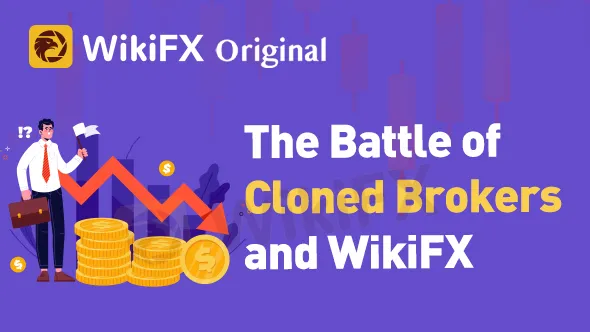Abstract:Cloned brokers are a growing issue in the forex trading industry. These brokers imitate the branding, website layout, and even the names and licences of reputable and regulated brokers. Keep reading to find out how can you utilize WikiFX to avoid falling into the traps of cloned brokers.

Cloned brokers are a growing problem in the world of forex trading. These brokers mimic the branding, website design, and even the names and licenses of reputable and regulated brokers, making it easy for unsuspecting traders to fall into their traps. In this article, we will discuss the dangers of cloned brokers and how they can easily trick users into falling into their traps.
Cloned brokers are essentially fake brokers that mimic the branding and website design, and sometimes even licenses of reputable and regulated brokers. They often use similar names to reputable brokers, making it difficult for traders to differentiate between the real and the fake.
One of the ways cloned brokers can easily trick users is through their websites. Cloned brokers create websites that are similar in design and functionality to the websites of reputable brokers. They use similar logos, colour schemes, and layouts to create the impression that they are legitimate brokers. They even copy the content from reputable brokers' websites, making it difficult for traders to identify any differences.
Another way cloned brokers can easily trick users is through the use of social media. Cloned brokers create social media accounts that are similar in name and design to the accounts of reputable brokers. They post content that is similar to the content posted by reputable brokers, making it difficult for traders to differentiate between the real and the fake. They often use paid advertisements to target traders, increasing the chances of their scam being successful.
Cloned brokers can also easily trick users by offering unrealistic returns on investment. They often promise high returns with little or no risk, making them attractive to new and inexperienced traders. These promises are often too good to be true, and traders who fall for them may lose their entire investment or even their life savings.
Cloned brokers often claim to be regulated and licensed, but in reality, they are not. To make their fake licenses look more convincing, fake brokers often copy the design and layout of the genuine license. They use the same font, logo, and watermark to make their license appear legitimate. They also include information such as the name of the regulatory authority and the broker's name, address, and license number. This makes it difficult for traders to differentiate between a legitimate license and a fake one. Cloning a license is a serious offense, and fake brokers who engage in this activity face severe consequences. Regulatory authorities have strict rules and regulations in place to ensure that brokers comply with their licensing requirements. Brokers who clone their licenses are in violation of these regulations and are subject to heavy fines and penalties.
Traders can protect themselves from cloned brokers by doing their due diligence and conducting thorough research on the broker they want to work with. This is where WikiFX comes in handy.

WikiFX is a comprehensive platform that provides traders with all the information they need to make informed decisions about their choice of broker. The platform features a global database of over 40,000 brokers, providing traders with detailed information on brokers' regulatory status, trading platforms, customer service, and trading conditions
WikiFXs regulatory inquiry tool allows traders to check the regulatory status of a broker. By using this tool, traders can easily verify if a broker is regulated and licensed by a reputable regulatory body such as the FCA, ASIC, or CySEC. This ensures that traders' investments are safe and secure, and they are protected from fraudulent brokers.
It is essential to be aware of the dangers of cloned brokers and to take steps to protect yourself from them. Always conduct thorough research on the broker you want to work with, and use reliable platforms such as WikiFX to verify their legitimacy. Never invest in brokers that promise unrealistic returns, and always be cautious when dealing with social media accounts that claim to be affiliated with reputable brokers.











